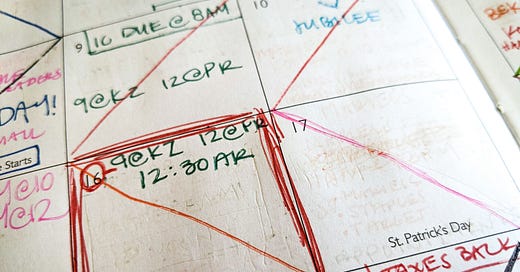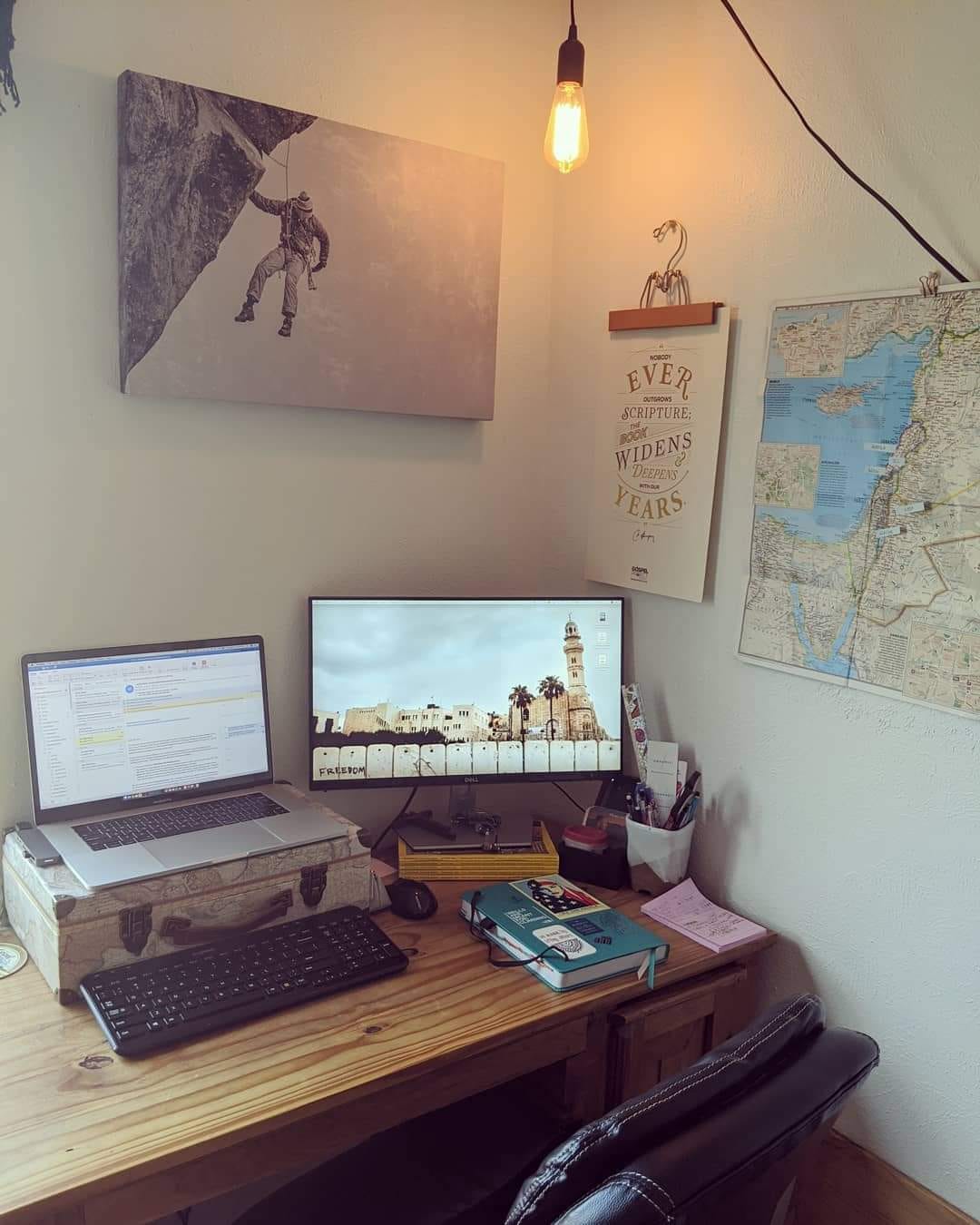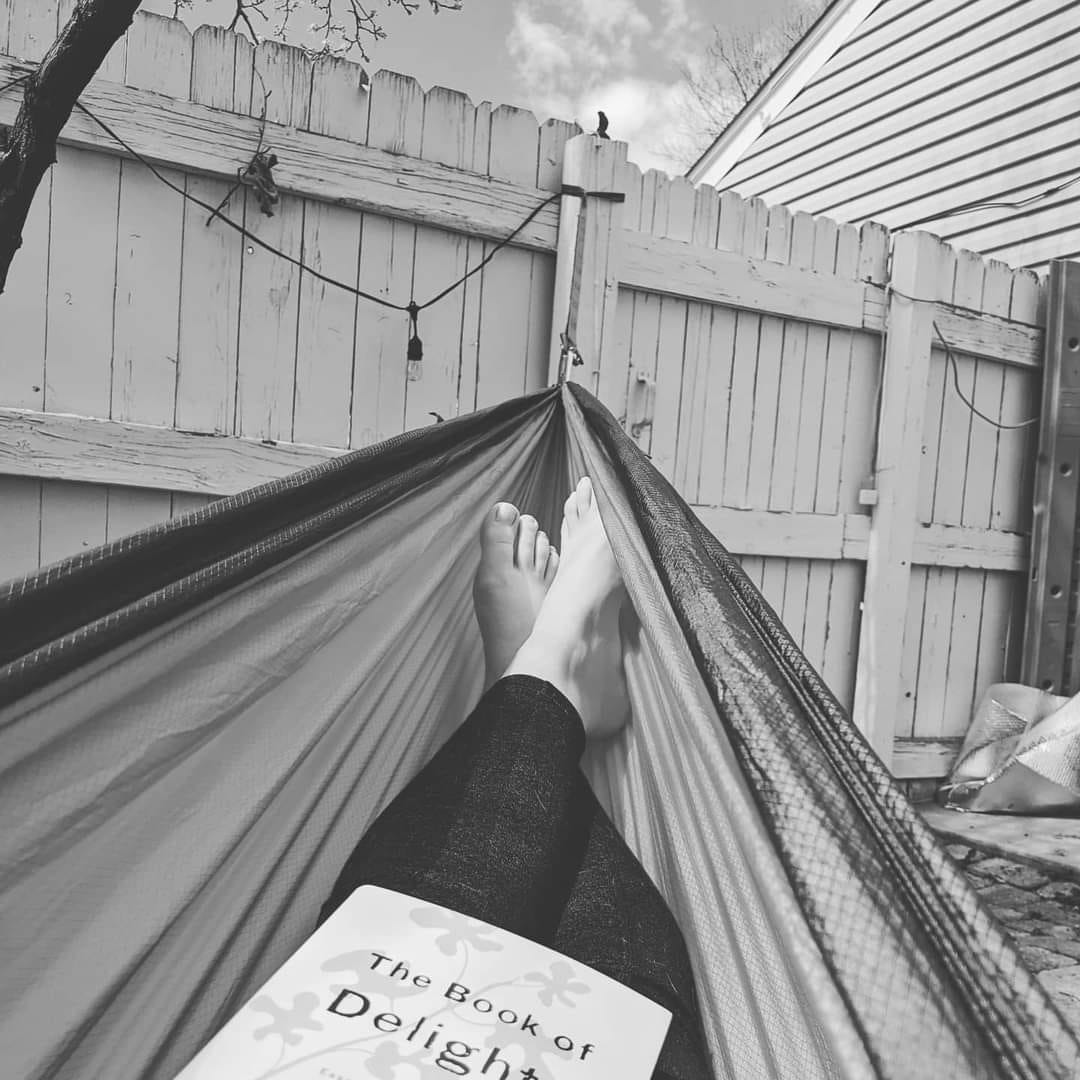Two years ago, the 16th of March was going to be an ordinary Monday of work meetings and a dry run rehearsal for the conference I was hosting that weekend. By the end of the day, I had cancelled an entire week of events. Then another.
I put a red outline around the date in my 2020 planner because it’s the day I went into the lockdown. It’s when the timer starts: just two weeks to flatten the curve. Just two weeks of isolation. Just two weeks of cancelled plans and we’d be back to business as usual. Just until Easter. Just until summer. You remember all the just-ing we did back then.
We scrambled to pivot our lives and our selves and figure out what the hell we were going to do for two weeks. I didn’t have a clue what to do when I erased the full schedule I often disappeared into. I tried to encourage us with an optimism that declared it probably wasn’t going to be that bad. That everything was figure-out-able for two weeks.
I thought I was familiar with waiting around and making tentative plans and prolonged uncertainty for weeks or months at a time, because I’d learned to do it when my husband was enlisted in the military. I mean, look at all the appointments and meetings and events and errands and life that had to be erased just to quarantine for 14 days. Surely we could use the break from routine.
I don’t want to forget how we did fill those first few weeks: the howling neighbors, Some Good News with John Krasinski, the risky but necessary walks with my PICU nurse best friend, the Zoom birthday celebrations, the online workout classes, the caring so, so much for each other. And there are things I would like to forget or had forgotten or didn't know yet, which is what I write about below in my notes.
The social media posts I wrote then have aged like souvenirs from another time.
I want to reflect on and speak to that moment they were written — to me and us in that moment. I want to practice holding it all: the horrible darkness and uncertainty, and the joyful service and resilience. The loss and death and fear, and the hope against all odds. It’s how we keep moving through grief and living with embodied hope.
What follows are two short posts I wrote in Spring 2020, in the earliest days of the COVID-19 pandemic. The original text is in the same font style as you’re reading now. When reflecting, I speak to myself in bold italics to say what I needed to hear, to clarify on things I thought I knew then, or to impart what I know now two years in.
Wander back a bit with me?
March 17, 2020 at 11:24 am
Day 2,395 of working from home. I can tell you: it gets easier when you establish routine, get dressed (shoes, too), eat real meals and not be tempted by your proximity to the kitchen, drink as much water and coffee as you want because you can take unlimited bathroom breaks. Keep coffee warm for when you need it. Make your workspace feel cozy and inspirational, even if it's just one thing, like a photo of who you serve, or a perfect lamp shopped from another less-used space in your home right now. Give yourself the gift of a tidy workspace each morning by cleaning up at close of business the day before. Decide what your morning routine will look like and add back in the quiet time, prayer, or journaling your hurried mornings and commutes typically sacrifice. For a change of scenery, open the blinds and peep at activity on the street. When you get bored of work, look out the window until you get bored of looking out the window, and get back to work. Work on the couch with your dog.
Set emotional and physical boundaries between work and home. If you don't have a door to close behind you when you leave work now, turn your computer and notifications off and close your planner and notes for the evening. You do not have to leave your email open all the time, especially when you're "done" working. If your work station is your dining table, picnic on a blanket on the living room for now. If your home or neighborhood is too noisy, play instrumental, lyric-free, or foreign-to-you-language music in headphones or through speakers to act as white noise that helps with distraction, engages your brain, and has physiological benefit such as decreasing stress and improving creativity, memory, and problem-solving.
Now, I know I don't have kids at home, but I know you might feel the pressure to do all the homeschooling and home cook all the meals and avoid all the screen time, but whatever is best for your family as a whole right now is what you will find freedom in doing. Do that. Be kind to yourself because it's a lot of change, even if your work is relatively similar to what you can do at the office. There's no right way to do this, except gratefully and one day at a time.
You wrote this for people who found themselves working from home for the first time. At this point, we thought it would be two weeks. Around the three week mark is when our focus and capacity waned. Four weeks in, we lost sight of an end entirely as hospitals overflowed, COVID cases continued to spike, and the death toll rose. Tips like “make your workspace inspiring” and “keep good boundaries” started to fall flat in the face of overhauling your entire work ecosystem (oh, and life) when we realized this wasn’t going to be just two weeks. It became less about productivity and more about survival.
Speaking of work, you didn’t have the term “essential workers” in your vocabulary yet, and they had the hardest jobs of all. We quarantined and worked remotely to save them, not only to protect our own health. We didn’t know if it would work, but we had to try to relieve the burden while they did all they could to keep hospitals and clinics afloat. Healthcare workers remain the forgotten heroes. Now you bet they wish learning to work remotely was their biggest concern. You could never know their sacrifices and all the impossible choices they had to make.
I’m glad you offered us permission to be kind to ourselves. You will repeat this to yourself again and again because you forget it ALL THE TIME. It’s a constant battle to have compassion that we are STILL learning how to do this.
One day at a time.
April 5, 2020 at 2:43 pm
Five years ago you lived alone on an island. There was significant weirdness to living on a 15-mile wide island where cows outnumber people and you self-quarantine during the winter to keep out of the hurricane-force winds. Where you grocery shop for 3 weeks or 3 days depending on the commissary stock, and only buy gas on weekdays because gas was unavailable on your side of the island on weekends. You didn't make plans because the government did. You craved home more than ever then. Home was people and places you couldn't have while isolated in the North Atlantic. Life was simpler, and it wasn't. Generosity was home church and small group and managing home while your husband deployed, keeping friends' kids alive and their tired parents company. Easter worship service at sunrise on the ocean. Cultivating vinho and figos and crepes and beterraba and saudade in gardens and at tables.
Five years later you swing in the hammock while you read a hardback book while the distant neighbors saw on their backyard project while the sky screams Spring blue while we grocery shop in masks. While the trees bud and you wake without alarms and your best friend goes to work choosing and scared to get sick. When the clouds slow drift by like barges on the horizon, because if you want to feel less claustrophobic these days, you can't look around. You have to look up.
You consider that it's one command to love God and love your neighbor as yourself, and that generosity is going to take creativity now. And one part of your brain aggressively reminds you how you wanted this: time to read and rest and renew, while another signals a danger your conscious mind can't identify. You've done a lot of this before.
Homesick. It's all so new. This feeling is a lot like being somewhere you didn't chose and are afraid to be. You almost always want to be somewhere else. Especially now. You're always homesick for what was, what will be, or who you can be with or be yourself.
Five years from now you won't remember the hammock or maybe even the homemade masks. But you'll remember connection and mercy and hope and generosity and brutiful sacrifices because they've always been what mattered.
Living in Portugal was nothing like living through a pandemic. You see now what a weird and reductive comparison it was to draw. But your experience was limited to only your 30 years of experiences, and I know you were trying to create comfort through familiarity while looking for light in the abyss. But you can’t yet appreciate the financial security, relational stability, and privilege you had back then. You knew loss but you’d encounter a new depth of it soon.
On the inside, you’re already feeling exhausted, lonely, homesick, terrified, and trapped. On the outside, you’re trying to keep it together for the people you love and lead. You happily volunteer frequently, host virtual gatherings, attend non-stop online events and workshops. While loving your neighbors, you craft a full schedule again to try to distract yourself from the pain of the snowballing losses.
It’s only April 2020 and this gets much, much worse. I know you think you can’t possibly lose more than half of your household income, your church community, your summer vacations, your conference, your mentors, your in-person therapy, your own home office, or your husband’s first featured film festival, but you can and you will.
You will survive it by doing the best you can with what you know. You will do a lot of virtual therapy sessions and distanced coffee dates. You’re trying so hard not to panic, although it would have been an entirely reasonable reaction to the circumstances.
Rumination and nostalgia are easier for you than grief, but you’re going to let it all out eventually. It will try to kill you if you don’t. There’s nothing brave or creative about avoiding your grief. You cannot heal what you don’t feel, they say. You get better at this.
Not only is this just the beginning of this pandemic, it’s also the beginning of a cascade of significant mental and physical health battles, the genesis of your faith shift, when you learn to walk alongside — and really show up for —hurting people, and where you begin to untangle your whole life because so much of it doesn’t really seem to fit anymore. And those are only the highlights.
It’s been so hard to unravel like this but it’s shaped you. It is still shaping you. Today, you’re drumming up the courage and space to write about it. You're relearning the particulars of your own voice. It hurts to realize you lost it to begin with. In all this chaos and time apart from normal, you realized you could stop being who you thought everyone wanted you to be, and actually could be who you are. Best of all, you like her. You are her.
It won’t feel like enough, but hold on to your people and your self and your integrity and your face masks. You’re going to need them. Keep reaching out and also exploring inward and just… try to remain soft, like you did on that island. It’s how you get through. With love. With presence. It’s the home of mercy and tenderness and generosity and connection and hope.
You did get that part right — it’s still what matters. That, and making plans in erasable pen.
Wandering backward & onward together,









Once again, I am blown away by your writing. I can hear your voice in the reflections and I can relate to all of it. Incredible.